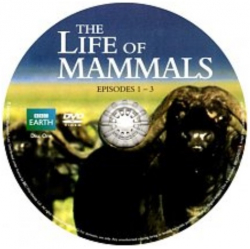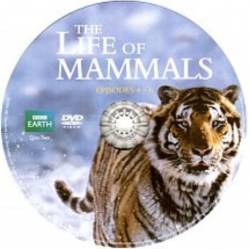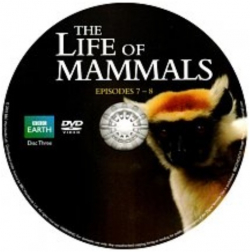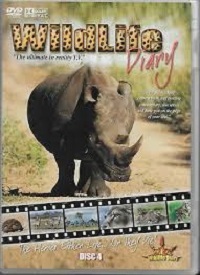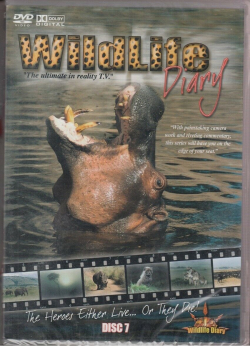Life of Mammals Disc 4
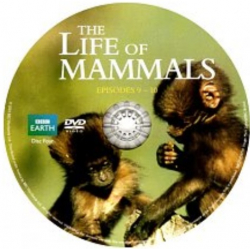
Type
Audio/Visual
Authors
Attenborough ( David )
Category
DVD - Episode/s of series
[ Browse Items ]
Publisher
BBC Earth, United Kingdom
Abstract
Three and a half million years separate the individual who left these footprints in the sands of Africa from the one who left them on the moon. A mere blink in the eye of evolution. Using his burgeoning intelligence, this most successful of all mammals has exploited the environment to produce food for an ever-increasing population. In spite of disasters when civilisations have over-reached themselves, that process has continued, indeed accelerated, even today. Now mankind is looking for food, not just on this planet but on others. Perhaps the time has now come to put that process into reverse. Instead of controlling the environment for the benefit of the population, perhaps it's time we control the population to allow the survival of the environment.
— David Attenborough, in closing
— David Attenborough, in closing
Description
Episode 9: The Social Climbers
The penultimate instalment focuses on monkeys. Together with apes (which includes humans), monkeys are part of the most social group of mammals. Their habits are rooted in relationships with others of their kind and a natural intelligence and inquisitiveness. Capuchins display all these qualities as they search for food. The differing face colours of the saki denote seniority within its group. The only nocturnal monkeys are douroucoulis and being active at night enables them to share the food resources of others in the same area. Pygmy marmosets, the smallest monkeys in the world, are captured feeding at the tops of trees and gnawing away on tree trunks to feast on the gum inside. Different tamarin species are shown co-operating to alert each other to the presence of a common predator, a tayra. Monkeys have good colour vision, and howler monkeys use it to select non-toxic leaves to eat. Attenborough travels through the African jungle with an alliance of species: several types of monkey and even mongooses combine to watch out for danger. They have a different alarm call for each enemy and Attenborough demonstrates this by placing a stuffed leopard nearby. In Sri Lanka, the naturalist also spends time with a troop of toque macaques — one of the most studied groups of monkeys in the world. It has been discovered that the creatures are born into a class system, in which position brings privileges. When the world's climate changed 10 million years ago, some monkeys ventured into open grassland, and they are illustrated by some of the most resourceful: baboons and geladas.
Episode 10: Food for Thought
The final episode studies apes and the evolution of human society to its current state. In Borneo, rescued orangutans that have spent time with humans have learned to imitate their activities, and have done so entirely on their own initiative. They are shown hand-paddling a canoe, washing socks, and using a hammer and saw. In Africa, Attenborough encounters a group of orphaned chimpanzees that are being prepared for their return to the wild. Again, they display a great capacity for gaining knowledge and passing it on. A different chimp culture exists in Uganda, where a large concentration of rival males lives in an uneasy alliance that, in rare cases, can lead to extreme violence. In Tanzania, Attenborough examines some of the earliest footprints to have been left by man's upright-walking ancestors. In the Kalahari Desert, indigenous San (Bushmen) undertake a persistence hunt. It provides an illustration of how early man pursued his prey with no weapons. The domestication of cattle led to farms and then to villages. With vastly increased food supplies, the number of human beings multiplied. Ritual and the arts flourished, and villages became towns. Attenborough visits Tikal, the capital of the Maya people, who achieved sophisticated advances in architecture, mathematics and astronomy. However, the Maya couldn't sustain their population — and, Attenborough warns, we may be precariously close to a similar catastrophe.
(https://en.wikipedia.org/wiki/The_Life_of_Mammals)
The penultimate instalment focuses on monkeys. Together with apes (which includes humans), monkeys are part of the most social group of mammals. Their habits are rooted in relationships with others of their kind and a natural intelligence and inquisitiveness. Capuchins display all these qualities as they search for food. The differing face colours of the saki denote seniority within its group. The only nocturnal monkeys are douroucoulis and being active at night enables them to share the food resources of others in the same area. Pygmy marmosets, the smallest monkeys in the world, are captured feeding at the tops of trees and gnawing away on tree trunks to feast on the gum inside. Different tamarin species are shown co-operating to alert each other to the presence of a common predator, a tayra. Monkeys have good colour vision, and howler monkeys use it to select non-toxic leaves to eat. Attenborough travels through the African jungle with an alliance of species: several types of monkey and even mongooses combine to watch out for danger. They have a different alarm call for each enemy and Attenborough demonstrates this by placing a stuffed leopard nearby. In Sri Lanka, the naturalist also spends time with a troop of toque macaques — one of the most studied groups of monkeys in the world. It has been discovered that the creatures are born into a class system, in which position brings privileges. When the world's climate changed 10 million years ago, some monkeys ventured into open grassland, and they are illustrated by some of the most resourceful: baboons and geladas.
Episode 10: Food for Thought
The final episode studies apes and the evolution of human society to its current state. In Borneo, rescued orangutans that have spent time with humans have learned to imitate their activities, and have done so entirely on their own initiative. They are shown hand-paddling a canoe, washing socks, and using a hammer and saw. In Africa, Attenborough encounters a group of orphaned chimpanzees that are being prepared for their return to the wild. Again, they display a great capacity for gaining knowledge and passing it on. A different chimp culture exists in Uganda, where a large concentration of rival males lives in an uneasy alliance that, in rare cases, can lead to extreme violence. In Tanzania, Attenborough examines some of the earliest footprints to have been left by man's upright-walking ancestors. In the Kalahari Desert, indigenous San (Bushmen) undertake a persistence hunt. It provides an illustration of how early man pursued his prey with no weapons. The domestication of cattle led to farms and then to villages. With vastly increased food supplies, the number of human beings multiplied. Ritual and the arts flourished, and villages became towns. Attenborough visits Tikal, the capital of the Maya people, who achieved sophisticated advances in architecture, mathematics and astronomy. However, the Maya couldn't sustain their population — and, Attenborough warns, we may be precariously close to a similar catastrophe.
(https://en.wikipedia.org/wiki/The_Life_of_Mammals)
Number of Copies
1
| Library | Accession No | Call No | Copy No | Edition | Location | Availability |
|---|---|---|---|---|---|---|
| Main | 2148 | 1 | Yes |
